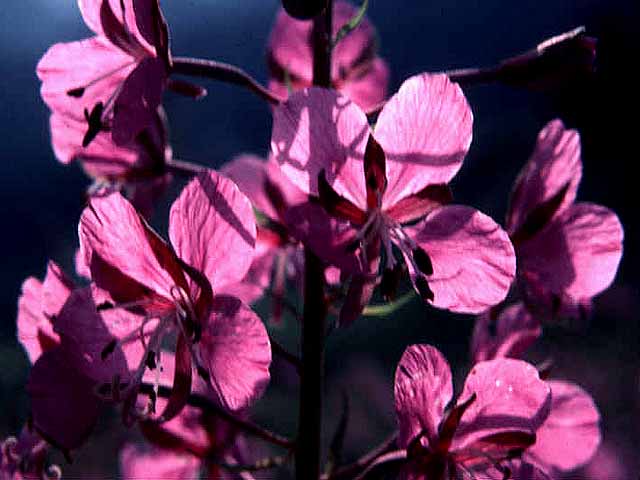
rumbling and shaking?
Prophets are coming
who shall exalt it."
from the First Part
of the Sonnets to Orpheus
by Rainer Maria Rilke
This week, an image of September
Ffireweed. Also: a new translation
from the German.
September: Fireweeds, Machines and the Poetry of Listening
|
XVIII
(ERSTER TEIL) Hörst dus das Neue, Herr, dröhnen und beben? Kommen Verkündiger, die es erheben. Zwar ist kein Hören heil in dem Durchobtsein, doch der Maschinenteil will jetzt gelobt sein. Sieh, die Maschine: wie sie sich wälzt und rächt und uns entsellt und schwächt. Hat sie aus uns auch Kraft, sie, ohne Leidenschaft, treibe und diene. Rainer Maria Rilke |
XVIII
(FIRST PART) Do you hear the New, Lord, rumbling and shaking? Prophets are coming who shall exalt it. Truly, no hearing is whole around such noise, and yet the machine's part too will have its praise. See, the machine: how it turns and takes its toll and pushes aside and weakens us. Though it draws energy from us, it, without passion, drives on and serves. (tr. Cliff Crego) |

| view / print
Picture/Poem
Poster: Sonnet to Orpheus: XVIII [FIRST PART] (86 K) | or
download
as PDF |
|
Selected Sonnets
to Orpheus twenty-two poems in the order they have been featured
(text only) |
PDF
of Six Sonnets |
*
Orpheus is the musician of musicians
of classical Greek mythology. He is the one
whose magical art of the lyre has the power to charm the whole of
Nature—the trees,
rivers, stones and even the wild animals, into the silence of listening.
Son of Calliope,
the muse of epic poetry, and a Thracian river-god (in some versions of the
story Apollo),
Orpheus married the nymph Eurydice who was fated to die of a serpent bite
on her heel.
In his profound grief, Orpheus follows his beloved into the underworld, and
with the
sound of his lyre enchants the resident deities into consenting to her release.
The one
condition which Orpheus has to meet during the ascent back to the upperworld
is that
he is not to look back at Eurydice. In a brief moment of weakness, he does,
however,
look back, whereby Eurydice vanishes forever without a trace.
Rejecting all women in his sadness afterwards, Orpheus is later ripped to
pieces by the
Maenads. This then is the source of the famous image of Orpheus' lyre and
singing head,
floating off through empty space to the island of Lesbos.
| see also
the Rilke
Posters |
| listen to other recordings in English and German of twelve poems from
The Book of Images at
The Rilke
Download Page (# Includes
instructions) |
(13) August: The Gentian and the Poetry of Light and Darkness
(12) August: Water, Granite and the Poetry of Change

|
See also another website by Cliff Crego: The Poetry of Rainer Maria Rilke |
a presentation of 80 of the best poems of Rilke in both German and new English translations: biography, links, posters |
|
See also: new |
|
"Straight
roads, Slow rivers, Deep clay." |
A collection of contemporary Dutch poetry in English translation, with commentary and photographs by Cliff Crego |